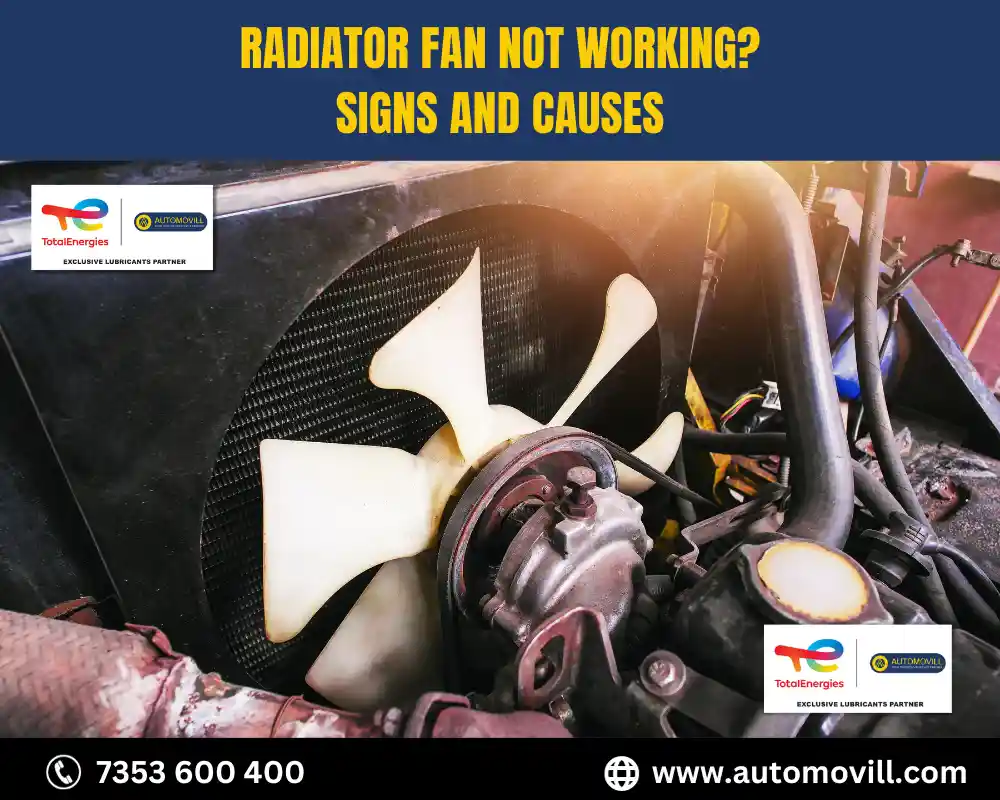
Your car’s radiator fan plays a crucial role in maintaining the optimal temperature of your engine.
When it’s not functioning correctly, it can lead to overheating, which can be detrimental to your engine health.
In this blog, we will discuss the importance of the radiator fan, signs of a malfunction, common causes, troubleshooting steps, and how to evaluate your coolant levels and radiator.
Let’s dive in!
Radiator Fan’s Role in Cooling the Engine
The radiator fan’s primary purpose is to regulate the engine’s temperature by dissipating excess heat. Here’s how it works:
- When your car’s engine runs, it generates a significant amount of heat. The coolant, a mixture of water and antifreeze, circulates through the engine to absorb this heat.
- As the hot coolant flows through the radiator, the radiator fan kicks in to help dissipate the heat.
- The fan draws in cool air from outside the vehicle and directs it over the radiator’s fins. As the air passes through the fins, it cools down the hot coolant, which then circulates back through the engine to repeat the process.
- This continuous cycle prevents your engine from overheating, ensuring it operates at the optimal temperature.
Signs of a Radiator Fan Not Working
Recognizing the signs of a malfunctioning radiator fan is crucial to prevent engine damage. Here are some common indicators:
1. Engine Overheating
One of the most noticeable signs is your engine temperature gauge creeping into the red zone. If you see this, it’s a clear signal that your radiator fan may not be working correctly.
2. Unusual Engine Noises
A malfunctioning fan may produce strange noises like grinding, squealing, or clicking. These noises can be a sign of worn-out fan blades or a failing motor.
3. AC Performance Issues
In many cars, the radiator fan is also used to cool the air conditioning condenser. If your AC performance drops when the car is stationary or at low speeds, it could be due to a fan problem.
Causes of Radiator Fan Malfunctions
Several factors can lead to radiator fan malfunctions:
1. Electrical Issues
Faulty wiring, blown fuses, or damaged relays can disrupt the electrical supply to the fan.
2. Fan Motor Failure
Over time, the fan motor can wear out, leading to fan blade immobility.
3. Temperature Sensor Problems
If the temperature sensor that controls the fan’s operation is faulty, the fan may not turn on when needed.
4. Physical Damage
Accidents or debris on the road can damage the fan blades or the fan housing.
Troubleshooting the Radiator Fan Issue
If you suspect your radiator fan isn’t working properly, you can perform some basic troubleshooting:
1. Check the Fan Fuse and Relay: Start by inspecting the fan fuse and relay. These are usually located in the engine compartment fuse box. Replace any blown fuses or faulty relays.
2. Test the Fan: You can manually test the fan by disconnecting the fan’s electrical connector and supplying power directly to it. If the fan doesn’t spin, it’s likely faulty and needs replacement.
3. Inspect Wiring and Connections: Examine the wiring and connections for any visible damage, corrosion, or loose connections. Repair or replace as needed.
Evaluating the Coolant Levels and Radiator
While troubleshooting the fan, it’s essential to also check your coolant levels and radiator for potential issues:
1. Coolant Levels: Ensure your coolant levels are within the recommended range. Low coolant levels can contribute to overheating.
2. Radiator Condition: Inspect the radiator for any visible damage or clogs. Clean any debris or bugs that may be obstructing airflow.
3. Water Pump: The water pump circulates coolant through the system. A faulty water pump can lead to inadequate cooling.
Hot Engine? Get Your Radiator Fan Fixed Right Away!
A faulty radiator fan can spell trouble for your car’s engine. It’s essential to address the issue promptly to prevent overheating and potential engine damage.
If you’re unsure about diagnosing or repairing the problem, it’s best to consult a professional mechanic.
Don’t risk your car’s health; ensure your radiator fan is in excellent working condition and enjoy a trouble-free driving experience.
If you have any questions or need assistance with radiator fan issues, feel free to contact our experts at Automovill. Your car’s well-being is our priority!
